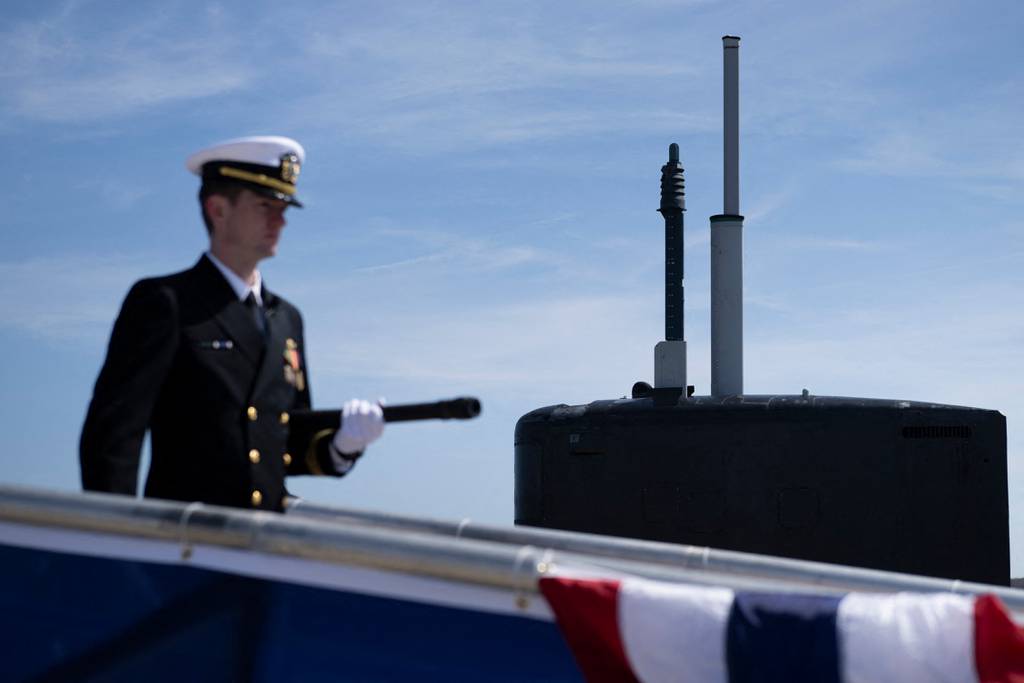
The House’s annual Pentagon spending bill only funds the procurement of one Virginia-class attack submarine for fiscal 2025 instead of two vessels as it has in previous years.
The draft spending bill, released Tuesday, overrides legislation the House Armed Services Committee advanced last month, which authorized partial funding for a second Virginia-class submarine. Instead, defense appropriators in the House have sided with the Navy, which requested funding for just one attack submarine this year citing production delays amid industrial base constraints.
“We have to rebuild the industrial base in order for us to build submarines,” House defense appropriations chairman Ken Calvert, R-Calif., told Defense News. “I want more submarines. But in order for us to get there, we have to rebuild the industrial base to get the necessary workforce to build the submarines. So we’re focusing on fixing the problem in order for us to build more submarines.”
The decision comes despite intense pressure from a large, bipartisan group of lawmakers led by Rep. Joe Courtney, D-Conn. They have lobbied defense appropriators to fund two submarines, arguing that only funding one submarine would adversely affect companies further down the supply chain.
“House Republicans’ first take at the defense appropriations FY25 bill will never become law,” Courtney said in a statement. “Aside from its hyper-partisan policy riders, it does not reflect the stated need of combatant commanders, the [FY25 National Defense Authorization Act], which advanced 57-1, and the will of 133 Democrats and Republicans who requested steady Virginia-class funding.”
The defense appropriations bill allocates $3.6 billion for a Virginia-class submarine as well as $3.7 billion in advance procurement funding to continue buying long-lead time materials for future attack submarines. The Navy hopes that the advance procurement funding will sustain vendors in the meantime.
But, Courtney argued, the bill “also does nothing to support the supply chain companies that do not receive advanced procurement funding, leaving many suppliers in the industrial base uncertain about future business.”
Courtney is the top Democrat on the Armed Services Committee’s seapower panel, and his Connecticut district includes General Dynamics Electric Boat, which makes the Virginia-class submarines.
The Armed Services Committee authorized $1 billion in incremental funding for a second Virginia-class vessel in its FY25 National Defense Authorization Act, which the House is scheduled to vote on next week. That money will not be available for industry unless congressional appropriators opt to include it in their spending legislation.
Courtney and Rep. Rob Wittman, R-Va., recently led 131 other lawmakers in a letter to defense appropriators beseeching them to fund two Virginia-class submarines against the Pentagon’s wishes.
“Preserving a consistent production schedule is essential for shipyard and industrial base stability, and to meet the Navy’s operational requirements,” the lawmakers wrote in a May letter to Calvert and Rep. Betty McCollum, D-Minn., the panel’s top Democrat.
While industry works to overcome production delays stemming from labor shortages and lingering pandemic-related supply chain shocks, the Navy assesses that it needs to build two Virginia-class vessels and one Columbia-class ballistic missile submarine to meet its fleet requirements.
The AUKUS agreement, in which the U.S. will transfer at least three and as many as five attack submarines to Australia in the next decade, would require a production boost of 2.3 to 2.5 Virginia-class vessels per year, on average.
The $833 billion defense spending bill includes $31.6 billion in the shipbuilding budget to procure four battle force ships.
It includes another $4 billion in funding to continue bolstering the submarine industrial base. Congress allocated another $3.3 billion in submarine industrial base funding when it passed its massive foreign aid bill in April.
The Senate is expected to mark up its version of the FY25 National Defense Authorization Act next week, and senators have not yet released their FY25 defense spending bill.
Bryant Harris is the Congress reporter for Defense News. He has covered U.S. foreign policy, national security, international affairs and politics in Washington since 2014. He has also written for Foreign Policy, Al-Monitor, Al Jazeera English and IPS News.
- SEO Powered Content & PR Distribution. Get Amplified Today.
- PlatoData.Network Vertical Generative Ai. Empower Yourself. Access Here.
- PlatoAiStream. Web3 Intelligence. Knowledge Amplified. Access Here.
- PlatoESG. Carbon, CleanTech, Energy, Environment, Solar, Waste Management. Access Here.
- PlatoHealth. Biotech and Clinical Trials Intelligence. Access Here.
- Source: https://www.defensenews.com/congress/2024/06/04/house-defense-spending-bill-nixes-funding-for-second-virginia-sub/



